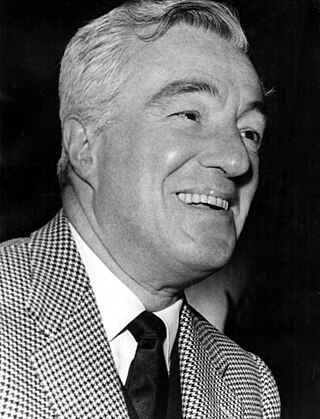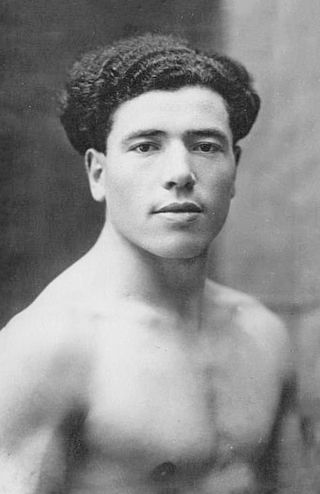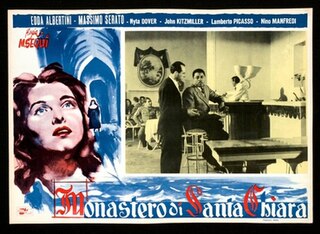Related Research Articles

Vittorio De Sica was an Italian film director and actor, a leading figure in the neorealist movement.

Cesare Zavattini was an Italian screenwriter and one of the first theorists and proponents of the Neorealist movement in Italian cinema.

Mario Alberto Ettore Monicelli was an Italian film director and screenwriter, one of the masters of the commedia all'italiana. He was nominated six times for an Oscar, and received the Golden Lion for his career.

Alessandro Blasetti was an Italian film director and screenwriter who influenced Italian neorealism with the film Quattro passi fra le nuvole. Blasetti was one of the leading figures in Italian cinema during the Fascist era. He is sometimes known as the "father of Italian cinema" because of his role in reviving the struggling industry in the late 1920s.

Telefoni Bianchi films, also called deco films, were made by the Italian film industry in the 1930s and the 1940s in imitation of American comedies of the time in a sharp contrast to the other important style of the era, calligrafismo, which was highly artistic. The cinema of Telefoni Bianchi was born from the success of the Italian film comedy of the early 1930s; it was a lighter version, cleansed of any intellectualism or veiled social criticism.

Poliziotteschi constitute a subgenre of crime and action films that emerged in Italy in the late 1960s and reached the height of their popularity in the 1970s. They are also known as polizieschi all'italiana, Euro-crime, Italo-crime, spaghetti crime films, or simply Italian crime films. Influenced by both 1970s French crime films and gritty 1960s and 1970s American cop films and vigilante films, poliziotteschi films were made amidst an atmosphere of socio-political turmoil in Italy known as Years of Lead and increasing Italian crime rates. The films generally featured graphic and brutal violence, organized crime, car chases, vigilantism, heists, gunfights, and corruption up to the highest levels. The protagonists were generally tough working class loners, willing to act outside a corrupt or overly bureaucratic system.
Steno, the artistic name of Stefano Vanzina, was an Italian film director, screenwriter and cinematographer. Two of his films, Un giorno in pretura (1954) and Febbre da cavallo (1976), were shown in a retrospective section on Italian comedy at the 67th Venice International Film Festival.
Vittorio Duse was an Italian actor, screenwriter and film director.

Carlo Ludovico Bragaglia was an Italian film director whose career spanned from the 1930s to the mid-1960s. He mainly directed adventure pictures and popular comedies, including some starring Totò. His 1942 film Non ti pago! was shown as part of a retrospective on Italian comedy at the 67th Venice International Film Festival.

Mario Mattoli was an Italian film director and screenwriter. He directed 86 films between 1934 and 1966.
Giacomo Gentilomo was an Italian film director and painter.
Clemente Fracassi was an Italian film producer, director and screenwriter. His career spanned from 1939 to 1967.

Gianni Franciolini was an Italian film director and screenwriter. He directed 19 films between 1939 and 1959.

The Beach also internationally released as Riviera and The Boarder) is a 1954 French-Italian comedy drama film directed by Alberto Lattuada and starring Martine Carol, Raf Vallone and Mario Carotenuto. In 2008 the film was selected to enter the list of the 100 Italian films to be saved.

The Mill on the Po is a 1949 Italian historical drama film directed by Alberto Lattuada and starring Carla Del Poggio, Jacques Sernas and Mario Besesti. It is based on a the third part of the novel of the same name by Riccardo Bacchelli. It premiered at the 1949 Venice Film Festival. The films was produced and distributed by Lux Film, one of Italy's leading companies of the postwar years. Extensive location shooting took place around Lombardy including at Bagnolo San Vito, Porto Mantovano and Curtatone. The films sets were designed by the art director Luigi Gervasi.

Erminio Spalla was an Italian professional heavyweight boxer, film actor and singer.

Forbidden Music is a 1942 Italian drama film directed by Carlo Campogalliani and starring Tito Gobbi, María Mercader and Giuseppe Rinaldi. An elderly composer recalls his youthful romance with a woman while a student in Florence.

Roberto Villa was an Italian actor and voice actor.
Giuliana Attenni was an Italian film editor. She worked on dozens of films between 1947 and 1973, and frequently worked with directors like Mariano Laurenti, Mario Mattoli, and Stefano Vanzina.

The Monastery of Santa Chiara is a 1949 Italian drama film directed by Mario Sequi and starring Edda Albertini, Massimo Serato and Nyta Dover. The film's sets were designed by the art director Angelo Zagame.
References
- ↑ Bayman p.59